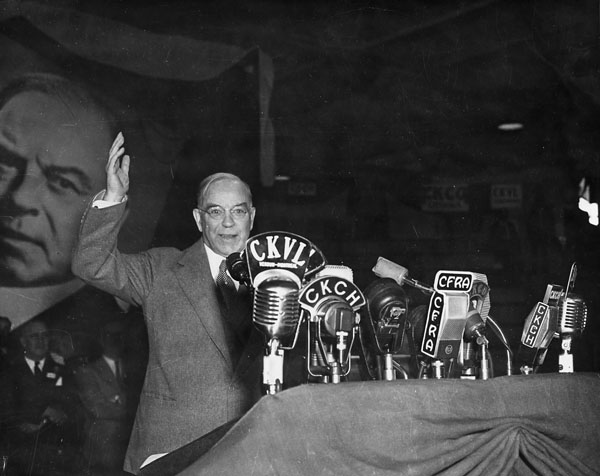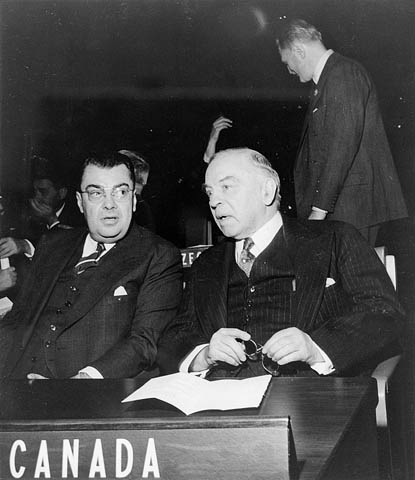Written by guest blogger Raymond B. Blake.
Leaders matter. So do their speeches, even if there is considerable disconnect between what leaders say and what they do.
We can see this in our own time. Justin Trudeau, for instance, has made diversity, gender equality, anti-racism, and human rights the foundations of his political speeches and his ideal of Canada. Yet, Canadians have seen allegations—and revelations—that betray such rhetoric.
He is not alone, of course. All prime ministers have attempted to construct particular national narratives and conceptions of national identity through their speeches, although these have not always corresponded to the policies they have pursued.
Perhaps, it is a case of hoping that by saying something often enough, people will begin to believe it.

Prime Minister Mackenzie King and microphones, November 1948.
The Ottawa Journal / Library and Archives Canada / e002505451
I have spent countless hours researching prime ministers’ speeches. Some of the findings are discussed in my recent CHR article on Prime Minister Mackenzie King and national identity. It offers a brief insight into my research on how prime ministers have helped to reconstruct the national narrative and Canadian identity through their speeches.
Of course, prime ministers make use of speech writers, but they are more attuned to image than to ideas. It is the PM who decides the particular ideal that is promoted in their speeches.
I suggest in the article that it was not the emergence of Quebec nationalism and the demise of Britishness in the 1960s that forced a re-conceptualization of the Canadian national identity. That reconstruction, especially in English Canada, began much earlier with Mackenzie King.
Sure, Mr. King was cautious. Yet, he understood that the world was changing with the Second World War; Canada had to change with it. Never sure of himself, he often expressed grave doubts privately about the ideas he championed publicly in his speeches that encouraged citizens to embrace a new Canadian identity.
For King, compromise was the essence of political leadership and political courage. That leadership and courage helped create a new national narrative and launch a new Canadian identity that would blossom in the generation that followed him.
I consider three elements in King’s speeches that helped to reconstruct the Canadian narrative.
First, King asked Canadians to participate in a period of social reconstruction that altered the role of the federal state and asked citizens to see themselves as citizens entitled to social and material rights by virtue of being Canadian. Social programs, notably family allowances, became an instrument of both rhetoric and statecraft to construct new notions of what it meant to be Canadian. Over time, the welfare state became a defining national characteristic.

Hon. Paul Martin (left) and Rt. Hon. W.L. Mackenzie King attending the opening session of the United Nations General Assembly, 23 October 1946.
Leo Rosenthal / Library and Archives Canada / PA-139806
Second, King spoke to Canadians of the necessity of creating a new world order based on liberal internationalism. Institutions such as the United Nations were important in creating a meaningful peace after six years of war. He had earlier been wary of foreign entanglements, but he later asked Canadians to reject their isolationist past to embrace a new international order, even as he worried privately about this new international role for Canada.
Third, King remained privately committed to most things British, but in his speeches he lamented Canada’s lack of outward symbols of independent nationhood. Although he had little success in changing Canadian symbols, he spoke frequently of the necessity of a distinctive flag, changing Dominion Day to Canada Day, and introducing a new Canadian Citizenship Act to create a distinctive Canadian citizenship.
Political speeches are one of the lenses through which we judge prime ministers. They also express the values leaders believe important to citizens.
More generally, my research shows that national narratives and identities are continually reconstituted through language and speech. For King, his speeches responded to the disruption created by nearly two decades of depression and war. It was a time of crisis, and King spoke of a new way of conceiving Canada.
Today, in the midst of another crisis forged by the Covid-19 pandemic, and as Canadians await a new Throne Speech later in September, we have to wonder if the current prime minister will embrace a new rhetoric in his speeches—as well as in a few policies—to reconstruct the national narrative to meet the new challenges just as King did in the 1940s.
Raymond B. Blake is professor of history and Associate Dean Research and Graduate Studies at the University of Regina. He is the author and editor of 20 books. His most recent book, Where Once They Stood: Newfoundland’s Rocky Road to Canada, co-authored with Melvin Baker, was published in 2019. It was awarded the Pierre Savard Award from the International Council of Canadian Studies for outstanding scholarly monographs on a Canadian topic and was a finalist for several awards, including the 2020 Canada Prizes in the Humanities and Social Sciences by the Federation for the Humanities and Social Sciences. Blake is also a member of the Royal Society of Canada.
His latest article in Canadian Historical Review entitled “William Lyon Mackenzie King’s Role in the Reconstruction of National Identity” is free to read for a limited time here.
The UTP Journals blog features guest posts from our authors. The opinions expressed in these posts may not necessarily represent those of UTP Journals and their clients.
Comments on this entry are closed.